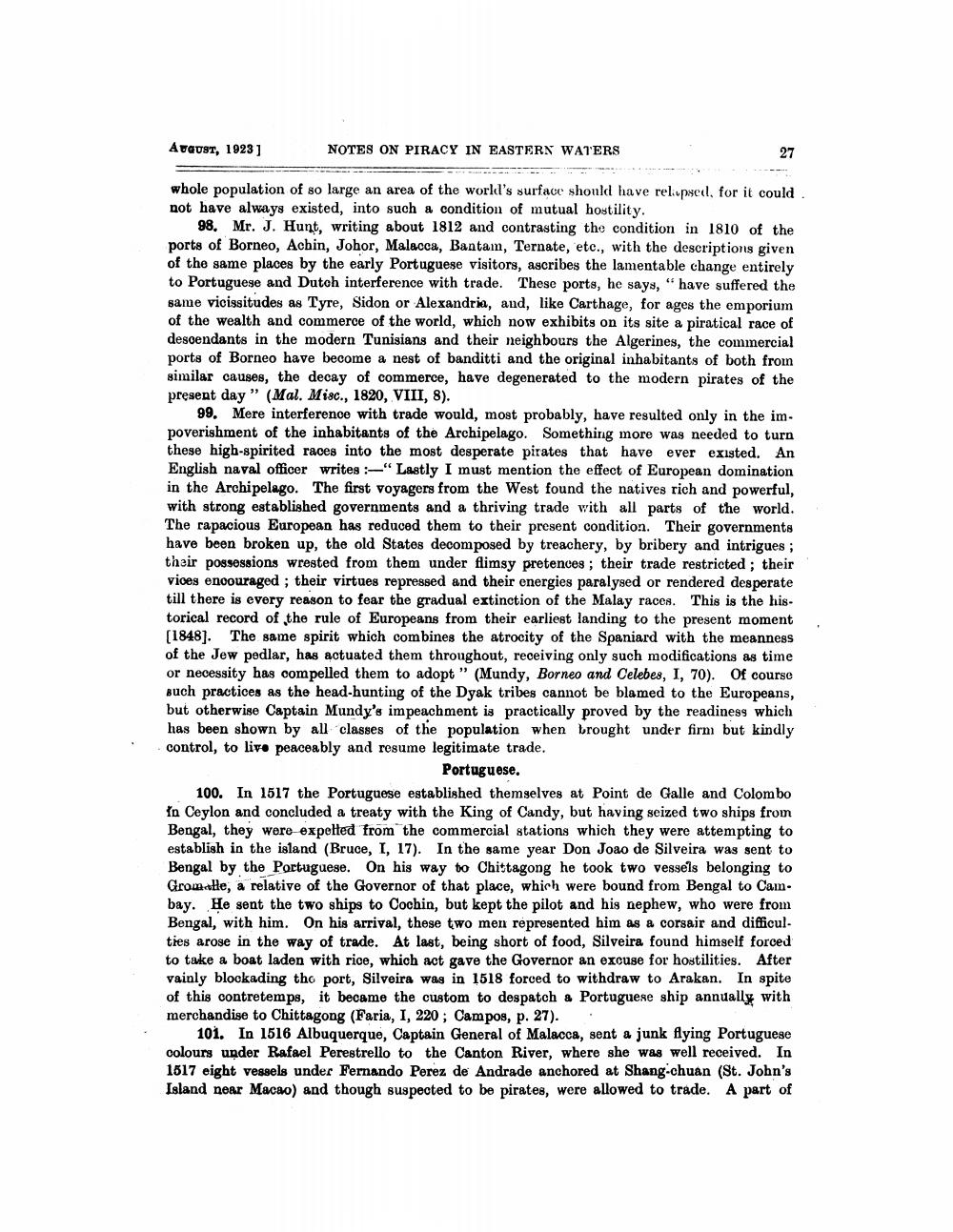________________
AUGUST, 1923)
NOTES ON PIRACY IN EASTERN WATERS
27
whole population of so large an area of the world's surface should have reliupseel, for it could not have always existed, into such a condition of mutual hostility.
98. Mr. J. Hunt, writing about 1812 and contrasting the condition in 1810 of the ports of Borneo, Achin, Johor, Malacca, Bantam, Ternate, etc., with the descriptions given of the same places by the early Portuguese visitors, ascribes the lamentable change entirely to Portuguese and Dutch interference with trade. These ports, he says, "have suffered the same vicissitudes as Tyre, Sidon or Alexandria, and, like Carthage, for ages the emporium of the wealth and commerce of the world, which now exhibits on its site a piratical race of descendants in the modern Tunisians and their neighbours the Algerines, the commercial ports of Borneo have become a nest of banditti and the original inhabitants of both from similar causes, the decay of commerce, have degenerated to the modern pirates of the present day” (Mal. Misc., 1820, VIII, 8).
99. Mere interference with trade would, most probably, have resulted only in the impoverishment of the inhabitants of the Archipelago. Something more was needed to turn these high-spirited races into the most desperate pirates that have ever existed. An English naval officer writes "Lastly I must mention the effect of European domination in the Archipelago. The first voyagers from the West found the natives rich and powerful, with strong established governments and a thriving trade with all parts of the world. The capacious European has reduced them to their present condition. Their governments have been broken up, the old States decomposed by treachery, by bribery and intrigues ; their possessions wrested from them under flimsy pretences; their trade restricted ; their vioes enoouraged; their virtues repressed and their energies paralysed or rendered desperate till there is every reason to fear the gradual extinction of the Malay races. This is the his. torical record of the rule of Europeans from their earliest landing to the present moment (1848). The same spirit which combines the atrocity of the Spaniard with the meanness of the Jew pedlar, has actuated them throughout, receiving only such modifications as time or necessity has compelled them to adopt " (Mundy, Borneo and Celebes, I, 70). Of course Buch practices as the head-hunting of the Dyak tribes cannot be blamed to the Europeans, but otherwise Captain Mundy's impeachment is practically proved by the readiness which has been shown by all classes of the population when brought under firm but kindly control, to live peaceably and resume legitimate trade.
Portuguese. 100. In 1517 the Portuguese established themselves at Point de Galle and Colombo In Ceylon and concluded a treaty with the King of Candy, but having seized two ships from Bengal, they were expelled from the commercial stations which they were attempting to establish in the island (Bruce, I, 17). In the same year Don Joao de Silveira was sent to Bengal by the Portuguese. On his way to Chittagong he took two vessels belonging to Gromadle, a relative of the Governor of that place, which were bound from Bengal to Cam. bay. He sent the two ships to Cochin, but kept the pilot and his nephew, who were from Bengal, with him. On his arrival, these two men represented him as a corsair and difficul. ties arose in the way of trade. At last, being short of food, Silveira found himself forced to take a boat laden with rice, which act gave the Governor an excuse for hostilities. After vainly blockading tho port, Silveira was in 1518 forced to withdraw to Arakan. In spite of this contretemps, it became the custom to despatch & Portuguese ship annually with merchandise to Chittagong (Faria, I, 220; Campos, p. 27). .
101. In 1516 Albuquerque, Captain General of Malacca, sent a junk flying Portuguese colours under Rafael Perestrello to the Canton River, where she was well received. In 1517 eight vessels under Fernando Perez de Andrade anchored at Shang-chuan (St. John's Island near Macao) and though suspected to be pirates, were allowed to trade. A part of




